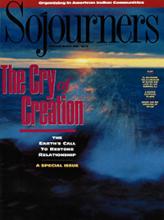A crisis of degradation is enveloping the Earth. Never before has our own species wielded so much power over creation. Our ever-increasing population, now 5.2 billion, combined with our use of instruments to press Earth's immense energy systems into our own service, makes the human race a formidable force.
If our governing ethic were "the Earth is the Lord's and all that it contains," if we resolved to bless and keep the creation as the Creator blesses and keeps us, if we would affirm through our actions the long-standing belief that avarice and greed are vices -- then this crisis would not be upon us. What follows is a description of the seven major degradations brought on by our assault on creation.
Land Conversion and Habitat Destruction
Since 1850, 2.2 billion acres of natural lands have been converted to human uses. This compares with Earth's 16 billion acres that have some kind of vegetation (another 16 billion acres are ice, snow, and rock) and a current world crop land of 3.6 billion acres. Names given for this conversion of natural ecosystems include deforestation (of forests), drainage or "reclamation" (of wetlands), irrigation (of arid and semi-arid ecosystems), and plowing (of grasslands and prairies). The most extensive conversion under way is tropical deforestation -- at the rate of 25 million acres (an area the size of Indiana) every year. Of the 400 million acres of crop land we have taken for agriculture in the United States, we convert three million yearly to urban uses. Fields for grazing and crops no longer are "carved" from forests, they replace the forests, and houses replace the best crop land.
"Woe to you who add house to house and join field to field," warns Isaiah, "till no space is left and you live alone in the land" (Isaiah 5:8).
Read the Full Article

